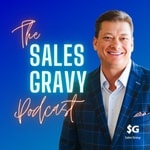Sales Gravy: Jeb Blount – Details, episodes & analysis
Podcast details
Technical and general information from the podcast's RSS feed.

Sales Gravy: Jeb Blount
Jeb Blount
Frequency: 1 episode/6d. Total Eps: 352

Recent rankings
Latest chart positions across Apple Podcasts and Spotify rankings.
Apple Podcasts
🇨🇦 Canada - careers
28/07/2025#41🇬🇧 Great Britain - careers
28/07/2025#34🇺🇸 USA - careers
28/07/2025#16🇨🇦 Canada - careers
27/07/2025#18🇬🇧 Great Britain - careers
27/07/2025#18🇩🇪 Germany - careers
27/07/2025#61🇺🇸 USA - careers
27/07/2025#19🇨🇦 Canada - careers
26/07/2025#14🇬🇧 Great Britain - careers
26/07/2025#34🇺🇸 USA - careers
26/07/2025#18
Spotify
No recent rankings available
Shared links between episodes and podcasts
Links found in episode descriptions and other podcasts that share them.
See allRSS feed quality and score
Technical evaluation of the podcast's RSS feed quality and structure.
See allScore global : 49%
Publication history
Monthly episode publishing history over the past years.
From Basketball to Business: Dre Baldwin’s Success Secrets
jeudi 5 septembre 2024 • Duration 49:08
Why Episodic Sales Training Fails and How to Fix It feat. Dayna Williams
jeudi 29 août 2024 • Duration 35:43
How Customer Retention Drives Revenue Growth feat. Barry Klein
dimanche 24 mars 2024 • Duration 40:39
How to Create a Sales Accountability Culture
mardi 29 décembre 2020 • Duration 01:00:35
How One Entrepreneur Leveraged Fanatical Prospecting to Build His Business
vendredi 18 décembre 2020 • Duration 37:29
Why You Should Stop Trying to Sell Yourself
samedi 24 octobre 2020 • Duration 07:27
Blending Text Messaging Into Your Account Management Process
vendredi 16 octobre 2020 • Duration 07:52
The 2 Sales Follow Up Superpowers
vendredi 2 octobre 2020 • Duration 38:35
The Cumulative Impact of Small Actions Every Day | 5 Minute Selling – Part 4
vendredi 18 septembre 2020 • Duration 17:28
Break Your Fear of Rejection Into Doable Doses | 5 Minute Selling – Part 3
vendredi 4 septembre 2020 • Duration 14:18

